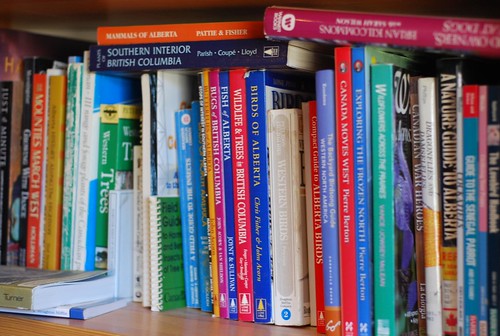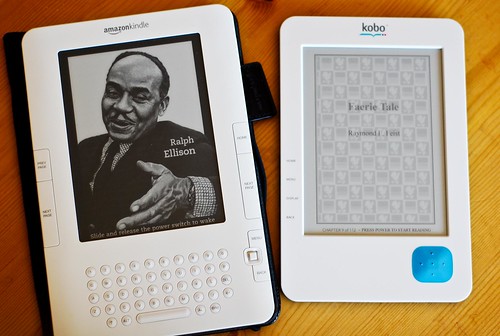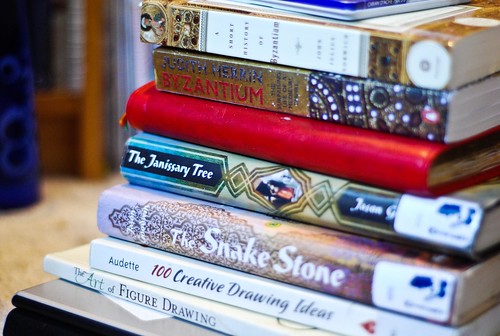
Yes, I know - we need to use the library more often, do a better job of donating or otherwise getting rid of books. But we tend to hang onto a lot of non-fiction and reference, and we are all re-readers. In fact, I'm often guilty of returning a book to the library or a friend, only to run out and buy my own copy. As for taking books to the used bookstore, I inevitably exchange them for credit, and come home with more books anyway.
Will these be our saviours?

I got the Kindle as soon as it became available in Canada. I was quite skeptical about how useful or readable an electronic screen would be till one of my research participants came into the lab with her Sony eReader, which she took travelling while on an archeological dig. Not only did the idea of carrying a whole pile of books along in one small package intrigue me, a good look at the Sony screen convinced me that it would be no harder on the eyes than printed paper.
At the start of the year, only the Kindle and the Sony were available in Canada, now joined by the Kobo. This is what my husband chose, after experiencing considerable eReader envy on our recent holiday. Compared to the Kindle, it has quite a few advantages - as a no-frills reader, it is much much cheaper, even after Amazon's recent price drop in order to compete with the B&N nook. It doesn't have connectivity - content has to be transferred via USB or bluetooth from your computer, but that isn't a dealbreaker for my husband nor many others, I suspect. I love the smaller, lighter size with the same size (maybe even slightly larger) viewing screen and I like the page navigation from the blue button on the right hand size - it bugs me a bit that the "previous" page button is lefthanded on the Kindle.
But the biggest advantage it has over my Kindle is that it is compatible with the eBooks available through the public library. I think that is fantastic, not least because it will expire at the end of the lending period - no overdue fines!
Both the Kindle and the Kobo have access to free public domain classics, and the Kobo comes preloaded with 100 books. Both allow a certain amount of sharing among multiple devices and family members (or trusted friends) linked to the same account. Both have apps that allow the books to be read by an iPhone, iTouch, or other such device. Choosing one over the other probably comes down to whether one really wants connectivity, and some social sharing - Kindle just introduced the ability to share book passages through Twitter or Facebook. I don't see myself ever using this, but some people might like it. The only distinct disadvantage I can think of for the Kobo is slow loading for a book when you first open it up (you can probably go get a cup of tea in the meantime) but after that, the screen refresh rate is fine. Tim hasn't had his long enough to really know how good the battery life is, but I can't honestly see how it would be a problem. And of course there is also the Sony - I don't have personal experience with it, but family and friends who have it are also very happy with theirs.
The REAL question, however: will it actually reduce the pile of books by the side of my bed?

Sadly, it appears not.
4 comments:
Very interesting review of these items!! I'd love one, but I like to look at pretty pictures in my books (when i'm in creative mode) and i think the ipad is the only one with a colored screen? right? Not willing to plop down that cash for it now.
yes - if you need color, these types of ereaders are definitely *not* for you. They're great for straight up text - but pretty much anything with pictures, like art/knitting/photography, I will still buy the real paper format.
Oh, I do hope books doesn't disappear. The book piles looks so yummy and interesting!
I agree, I still love paper books also. I tend to think of eReaders as a supplement or complement to paper books, not as a replacement.
Post a Comment